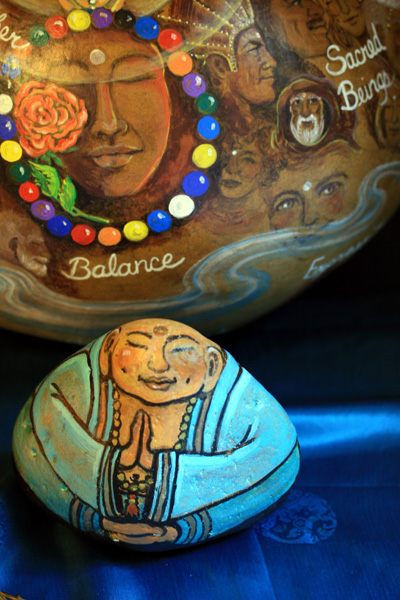Tea and Intolerance, Part Five: What Can Be Done

Aikido World Headquarters, Tokyo, Japan; photo by Alan Briskin
I began this series of posts by addressing the question of what can be done in groups and collectives whose members value open and honest dialogue but are faced with individuals or sub groups who are adamant about their beliefs, dogmatic in their tone, and unrelenting in their positions. I explored the Tea Party as a case in point and wondered how there might be a way to understand their appearance on the national stage from historical as well as psychological and social perspectives. Most critically, I wondered if there is a way to step inside another’s shoes without having to agree with them, but still able to respect the larger framework and validity of their respective positions.
To my delight I began to receive answers from the universe of people, events, and projects I interacted with. Here was my first revelation – that when one asks a question sincerely without too many preconceived answers, new possibilities begin to emerge. I began to notice that my attention, having been shaped by my interior question, began to have greater focus, subtlety, and agility. I could pay attention longer to an issue rather than moving to a reductionist position. I could sense nuances and texture to arguments that seemed at first blush right or wrong and I could move more easily through the ambiguity and complexity of the issues. I was having reverse attention deficit disorder symptoms without the side effects of medication. For entrepreneurs reading this, we should call it RADD and market it.
Second, by listening with this kind of attention, I began to see, hear, and grasp new facets of friends and colleagues, many of whom I’ve known for decades.
Rather than offering opinions about the particular events of the day, dramatized by the daily newscasts, our conversations deepened and had a broader sweep. We began talking about the history of people in general who have lost power and considered how we all try in different ways to hold onto the past. The discussion was no longer about us and them, but about the human condition. We also talked about the consequences when deeper values feel betrayed and anger and powerlessness enfold us. In the USA, for example, there is a deeply held value that if one works hard, one can succeed and be rewarded without virtually any limit. This is a critical, almost sacred belief. It is a belief that for some felt violated by perceived government intrusion as well as by seeing executives who oversaw our financial collapse bailed out by government and then still reaping rewards.
For another colleague, the unfolding of events with the Tea Party was like a detective story with a reminder to follow the money. Behind the movement that was televised was another movement of industries such as oil, gas, and coal that sought in the Tea Party a chance to protect themselves from government oversight and regulations emerging in the face of climate change. Executives like the Koch brothers understood how to strategically invest in a political movement that provided their own industries cover. Of course it helped that these executives did not believe in climate change or that government should regulate them or that current subsidies to their industries should be altered. Their world view had more to do with self-interest and personal honor, qualities that are also deeply rooted in American society and viewed quite positively by many.
Finally, another colleague acknowledged that she has stopped watching the news altogether and that she found herself temporarily at an impasse. Although she personally believes we cannot rid ourselves of those things we condemn, she still feels a meta intolerance for others she sees as incapable of dealing with complexity and who are also unwilling to engage in genuine dialogue. For her, the experience of vitriolic rhetoric and an utter absence of curiosity to go beyond one’s existing opinions are akin to being exposed to toxins that bring tears and pain into her body.
Taking People Seriously, But Listening Differently
Beyond the new kinds of conversations I was having, my next revelation came in a exchange with a political colleague from a major California city who had been on the city’s school board for decades. How, I asked incredulously, could he tolerate being on the school board for decades and actually seek reelection, voluntarily? School boards are notorious for inviting the most extreme and unyielding arguments in the name of civic discussion. He took my question in respectfully, and with a knowing smile, which I appreciated. He was silent for a bit, as if rummaging through his mind for how to respond to me both intellectually and emotionally. He said to me, almost as if musing out loud, “I take people seriously, but not literally.” And then after a pause he said, “What I notice is that most people take each other literally, but not seriously.”
Here was, at least in part, an answer to my question about working with diversity, including people who are adamant, certain of their positions, and aggressive in their expression. It is possible to listen to others without being pulled into the literalness of their world view. And at the same time, it is possible to consider another person’s opinions respectfully, giving them their due as human beings worthy of dignity. We are all worthy of having dignity.
To do this effectively, however, is a discipline that is more about what happens within us than simply practicing an external behavior. We have to ask ourselves whether we actually do take others seriously, and if not, what internal recalibrations are possible. Humans can sense in others, imprecise as it may be, what is authentic and what is expedient.
This brings me back to the larger question of collective wisdom and folly. My colleague, who found herself at times caught in feelings of meta intolerance for others, is an exceptionally empathic person. She is one of those rare individuals who senses into others, seeking to resonate with their feelings and thoughts. Possibly this is how her thoughts came to rest on a subject quite important to me, the neuro psychology of group interaction and behavior.
She spoke of some of her recent readings in this area and noted that humans are wired for empathy as a function of our being social animals. We need each other to survive. At the same time, she said, we are wired to overestimate threat and cautious of letting our guard down. This is also a survival mechanism. The dilemma is in resolving these two facets of our human wiring and the danger is that we end up operating in a closed system of thought, suspended in a state of reactivity, and fearful of letting go of what we know. Without being conscious of making a choice, we often choose to stay in a place of fear creating a vicious cycle that reinforces our closed system of thought while maintaining a closed in network of friends who think like we do.
The alternative is becoming conscious of our choices, which also means becoming responsible for our thoughts. This does not mean, however, that we can mechanically choose what we want to think, willy nilly, as if choice was like shopping for sale items at Target. Mindfulness of this kind requires a great deal of practice at just noticing what thoughts emerge, and what feeling associations go along with these thoughts. If for example, I find myself thinking of people who annoy me, I can notice if that brings me feelings of pleasure because I feel superior to them or alternatively feelings of guilt, betrayal or anger. I can learn to gently nudge my thoughts and feelings in different directions, to see what comes of it. If for example, I notice that my stream of thoughts suggest I am feeling stuck or lonely or misunderstood, I can take a walk, read a book, or watch a movie and notice how the thoughts and associated feelings begin to morph. The practice is not about forcing oneself to have different thoughts but more like an artist becoming acquainted with a new brush technique and seeking to master that technique for their artistic expression. For myself, I have always been privy to dark thoughts but have learned to bring them into a greater context that includes empathic understanding.
The same is true for our work in groups. We do not need to regulate our thoughts in an austere or judgmental manner. By noticing how our thoughts emerge in relation to others, we are preparing ourselves to create new avenues of communication. We can begin leaning into empathic responses without denying our cautionary ones. We can listen for the symbolic and metaphorical meanings behind literal statements without ignoring that differences may exist. And we can actually become more direct with others. Why? Because the subtle ways we patronize and condescend to each other is based on fear and control.
Respectful communication can include highlighting and even intensifying differences when both parties are genuinely engaged with each other. This means, however, that we cannot simply be mouthpieces for others – whether that is a group we are affiliated with or a canon of beliefs we have become identified with. We generate real dialogue when we stand in our own authentic space, acknowledge our own worldview, and then nudge ourselves and others into new perspectives, perspectives that incorporate multiple views but are slaves to none.
This is what is achieved through inquiry and what is meant by emergence, an emergence of new thought forms that build on the bones of our memory joined with the sensing of a desired future. This way of being in groups is haunting us, reminescent of the earliest human who sat together gathered around a fire or those individuals over two millenia ago who first imagined the common space of the Athenian polis. A future is wating to be born from us and through us, and its labor pains are being felt right now throughout the world.
Read all of this five-part series:










